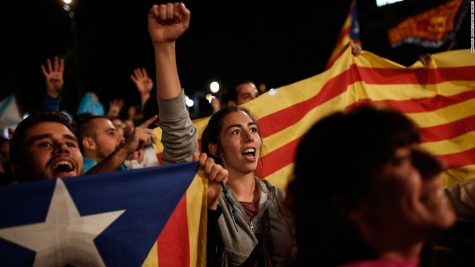The Ripple Effect: What’s in a vote?
Spain and Catalonia’s rift over secession is a matter of big picture vs. little picture

Consider: a region has its own language, its own flag, its own parliament, its own police force and control over some matters of public life like its own healthcare and schools. Could it be a country?
The potential nation-to-be at hand is Catalonia, a part of northeastern Spain that boasts Barcelona as its capital and where Catalan is spoken side-by-side with Spanish. On Oct. 1, Catalonia went ahead with an independence referendum, despite the vote having been deemed illegal by the Spanish Constitutional Court.
The Spanish government in Madrid responded by sending police officers to storm voters with batons and rubber bullets.
While Spain’s reaction to the vote was excessively violent, the country has its reasons for not wanting Catalonia to secede: according to the BBC, the area’s exports make up over 65 billion euros’ worth of Spain’s total, and at the same time, it owes a hefty debt to the government.
I am not about to pass judgment on whether or not Catalonia should secede. But a decision can’t be made based off such a deeply flawed vote defended as democracy in action.
Already, the “silent majority” of Catalans protesting against the independence effort have made it clear that not everyone got a say in the referendum, empathetically chanting “Yo soy español” (“I am Spanish”) in response to the secessionists’ cries of “Madrid nos roba” (“Madrid is robbing us”).
But the anti-secessionist side enthusiastically reaffirming its Spanish nationality barely appears in the referendum results. Much of the Catalan government’s justification of secession hinges on the argument that 90 percent of those who voted supported Catalonia’s independence.
Yet less than half of all eligible voters cast ballots to begin with.
Perhaps most voters just didn’t want to get in the way of the baton-wielding police officers storming polling stations, but what that then reveals about those who did vote is that they were the ones passionate enough about the question on the ballot that they opted for the risk. If 90 percent of 43 percent of a region supports something with that level of fervor, does that mean only 38.7 percent overall are committed?
Not necessarily, but this is what a sizeable chunk of the miscommunication between Catalonia and Spain boils down to. Catalan President Carles Puigdemont’s government is switching back and forth from the little picture argument of “90 percent of us who voted want secession” to the big picture concession of “We’re still placing our declaration of independence on hold to give us time for negotiations with Spain” — because it’s uncertain how many people that 90 percent vote represents. The conflicting messages give an indicator of how skewed such a tally is.
The democratic right to exercise the voices of the people is nothing if only a few amplify their voices with a vote and the rest are drowned out in the hubbub; a problem not only in Catalonia’s present situation, but in democracies around the world. Even the U.S. isn’t exempt: according to Pew Research Center, out of everyone eligible to vote in the last presidential election — all citizens in the right age groups — the percentage of those who did hovered at a measly 55 percent.
Part of the burden lies on the people, of course. You can’t opt out of exercising that right and then complain about the outcome others decided on in your stead. But such a vote — especially one as precedent-shattering as that of Catalonia’s — should be made more accessible, at the very least, to keep people from making up simple excuses like “I didn’t want to be dragged away from a polling station by a cop.”
Yes, in Catalonia’s case, Spain’s argument that the vote was unconstitutional barred the way for a straightforward referendum. I’ll concede it now: virtually nothing could have been done by the Catalan government alone at that point to circumvent such an obstacle.
But I will say that its declaration of independence has rightfully been placed on pause. After all, an issue as fraught as secession, with the potential to stir up unrest in other nations, shouldn’t move forward in even the vaguest democracy without the input of as many as possible.
A decision can’t be made solely based on the loudest rather than the most.








Anon Y Mous • Oct 18, 2017 at 11:53 am
I LOVE YOU AISHWARYA